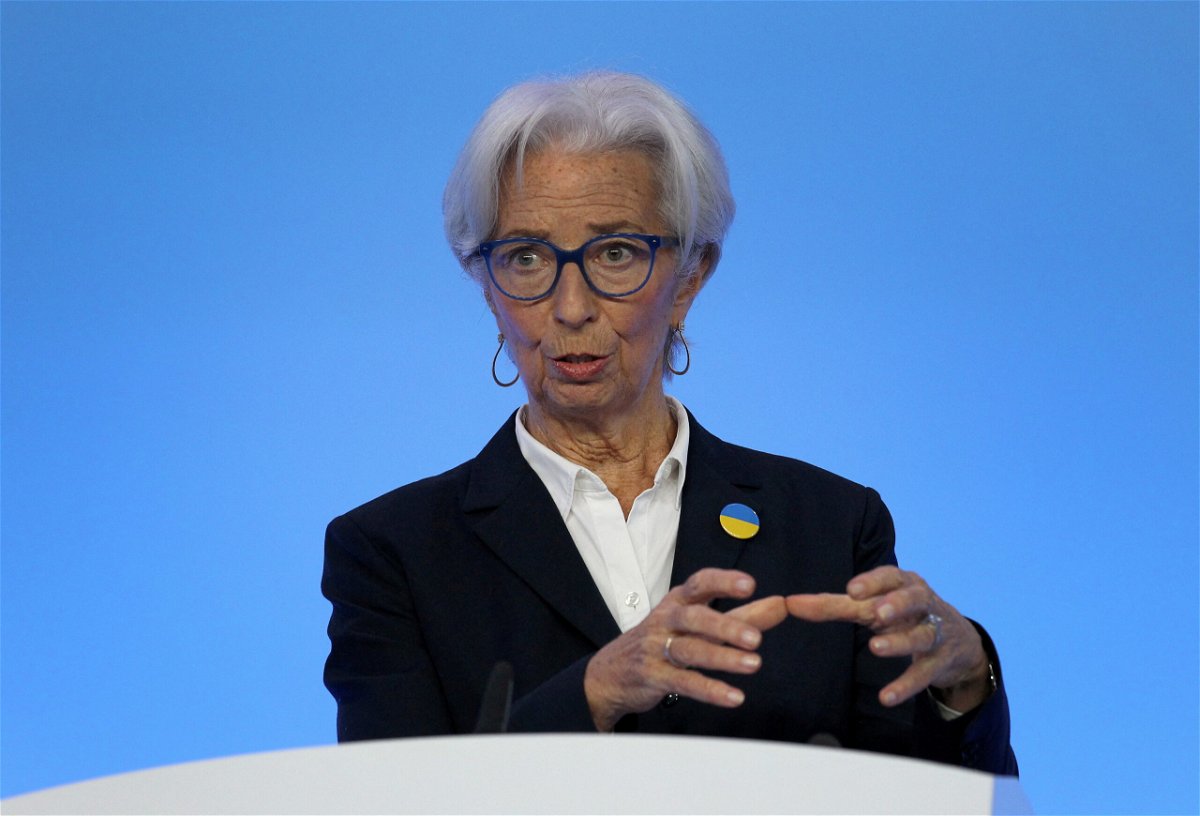The European Central Bank raises rates for the first time in 11 years

By Julia Horowitz, CNN Business
In a bold attempt to get inflation under control, the European Central Bank on Thursday announced it would hike its key interest rate by a half percentage point.
That marks the first time since 2011 that the ECB has raised rates, and takes Europe’s main rate back to zero. Rates in the region have been negative since 2014.
The move, which takes effect on July 27, comes as Europe battles record inflation fed by surging energy prices. Annual inflation in the European Union jumped to 9.6% in June. It reached 8.6% for the 19 countries that use the euro.
The central bank had previously indicated that it would increase rates by a smaller margin, but decided it needed to be more aggressive based on an “updated assessment of inflation risk.”
“Inflation continues to be undesirably high and is expected to stay above our target for some time,” ECB President Christine Lagarde said at a press conference.
The central bank declined to commit to a definitive trajectory for rate hikes moving forward, seeking to keep its options open.
“From now on we will make our monetary policy decisions on a data-dependent basis,” Lagarde said. “We will operate month-by-month and step-by-step. What happens in September is going to depend on what data we have for September.”
The ECB also unveiled a new bond-buying tool aimed at keeping a lid on borrowing costs in highly indebted countries in the euro zone, such as Italy and Greece. The central bank wants to maintain cohesion within the region that uses the single currency.
The so-called Transmission Protection Instrument “can be activated to counter unwarranted, disorderly market dynamics that pose a serious threat to the transmission of monetary policy across the euro area,” the central bank said.
The European Central Bank stands ready to deploy the instrument if necessary, granted that countries meet certain metrics for fiscal and economic health, Lagarde emphasized.
“I can assure you we would rather not use TPI,” she said. “But if we have to use it, we will not hesitate.”
A web of risks
Investors had a lukewarm reaction to the announcement. The euro, which recently hit parity with the US dollar for the first time in two decades, ticked up after the announcement to about $1.02. European stocks struggled to find direction, leaving the Stoxx 600 index flat.
The currency’s weakness is making the problem of inflation even worse, since it means European companies need to pay more for imports, including energy.
The ECB faces an uphill climb as it ramps up efforts to stop the rapid run-up in prices. Although the summer tourism season, pandemic-era savings and a robust job market continue to prop up Europe’s economy, growth is slowing.
The central bank isn’t penciling in a recession yet. In June, it said that it expects output to expand by 2.8% this year and by 2.1% in 2023.
“The baseline scenario, there is no recession, neither this year nor near year,” Lagarde said on Thursday, though she acknowledged the horizon is “clouded.”
Recession risks could constrain the ECB’s ability to keep hiking interest rates, which help combat inflation but also slow down the economy.
The ECB is already pacing far behind its peers. After cutting rates to zero at the beginning of the pandemic, the Fed has been on a rate-hiking spree since March, raising its benchmark rate in huge increments over the past few months to combat runaway inflation. Only the Bank of Japan — which on Thursday maintained its super-easy policies — hasn’t budged.
It also has to deal with a high degree of uncertainty regarding energy supplies, which is making forecasting future inflation difficult.
Russia’s Gazprom resumed gas shipments along the crucial Nord Stream 1 pipeline on Thursday, easing fears that it wouldn’t come back online after a period of scheduled maintenance. But it isn’t operating at full capacity, and anxiety lingers that Russia could still shut off gas at some point in retaliation for Western sanctions.
Plus, Europe’s third biggest economy is in the throes of a political crisis that’s rattling the country’s financial markets. Italian Prime Minister Mario Draghi, an investor favorite, submitted his resignation to the president on Thursday after losing the support of several key parties in his governing coalition. That could lead to early elections.
The-CNN-Wire
™ & © 2022 Cable News Network, Inc., a WarnerMedia Company. All rights reserved.